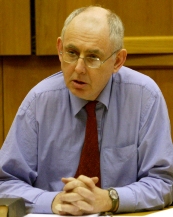 One of the world’s leading Middle East scholars, international relations theorists and analysts of global affairs has died after a short illness.
One of the world’s leading Middle East scholars, international relations theorists and analysts of global affairs has died after a short illness.
Professor Fred Halliday, who worked at the London School of Economics and Political Science for more than 20 years, was renowned for both brilliant research and inspirational teaching.
Although he left LSE for a new post in Barcelona, which is where he died, Professor Halliday returned regularly to the School to lecture.
LSE Director Howard Davies said: ‘Fred was one of the pillars of the International Relations Department – and indeed of the whole School, for many years. An enormously distinguished scholar, and an inspirational teacher, he also threw himself into other aspects of the School’s life. Until close to the end he was engaged in fund-raising initiatives in Spain and the Middle East, where his passing will be particularly felt. Fred was a great friend of the Middle East, but also a fearless critic of many regimes there.
‘I will miss his advice, and his infectious enthusiasm for life, immensely. Many others in the School community will feel the same. We will, of course, plan a more concrete way of marking his passing when we have digested the shock.’
Professor Halliday’s work ranged from the political complexities of the Middle East and its international relations to revolutions, gender and IR theory. Among his publications are Two Hours that Shook the World, Revolutions and World Politics and The Middle East in International Relations.
Professor Mick Cox, Department of International Relations and Co-Director of LSE Ideas, remembers a 30-year friendship with a man of ‘political bravery’.
‘It was with great sadness that I learned of the death today of Professor Fred Halliday, a very dear and close friend whom I got to know back in the ideologically charged days of the late 1970s, and then later in the 1980s when he and I met over in Belfast where I was then teaching.
‘I could almost say that Fred and I divided over the Cold War but thankfully united over Ireland – neither he nor I had any time for the “armed struggle” and even less for those armchair provos who sought to justify other people’s murderous politics from afar. Many things will no doubt be said over the coming days about Fred’s contribution to scholarship, his brilliance as a writer and lecturer, and never to be forgotten, his extraordinary knowledge drawn from several cultures and command of many languages. It was indeed typical of Fred that when he went to live in Barcelona a few years back, he not only improved his Spanish but became fluent in Catalan as well.
‘The oft-repeated cliché that this person or that wore their scholarship light, never applied as much as it did to Fred Halliday. Still, my own memories of him do not just relate to his extraordinary achievements as one of the great public intellectuals of our day, or even as one of the “superstars” of a School he loved so much. I remember him too as a man of the left who like many of us on the left got quite a lot of things wrong – most notably the outcome of the Cold War – but quite a few things right too, most obviously about the genocidal nationalist dangers that were bound to be let loose once the Cold War came to an end. I also recall his political bravery. He fell out very badly indeed with many of his old comrades on the New Left Review when he decided to support the war against Iraq in 1991.
‘He lost some too much later when he refused to join in the hue and cry against Islam and what some on the neo-con right were now terming “Islamo-fascism”. Typically, Fred never ducked the big issues and always let friend and enemy know exactly where he stood. He even told me once (and he repeated the story several times thereafter, but with that typical twinkle in his Irish eye) that one of the reasons I left Northern Ireland in 1995 – a year after the first IRA ceasefire – was that I just could not hack the peace! Well, I did leave (though it had nothing to do with peace!) and in the end – partly at Fred’s encouragement – finally arrived at the LSE in early 2003; extremely happy to be in the same International Relations Department as the great man. Fred was “IRD” through and through; a legend amongst the students and a loyal friend to so many of his colleagues, but most obviously to his closest friend of all, Margot Light.
I saw Fred off and on over the next few years. But it seemed clear that he was looking for pastures fresh. I did though have the very great privilege of chairing his last Public Lecture at the LSE before he resigned to take up his new position in Barcelona. It was typical Fred: witty, wise, wide-ranging, and generous. It was the first and last time I have ever seen an audience at the LSE give anybody a standing ovation. He deserved it then. On this very sad day he deserves it even more for all that he has meant to so many of us for so long.’
Watch the video of Professor Halliday’s last LSE lecture
Open Democracy page of tributes | Guardian obituary| | The Times obituary| | BBC Radio 4 Last Word programme (30/4/10)




